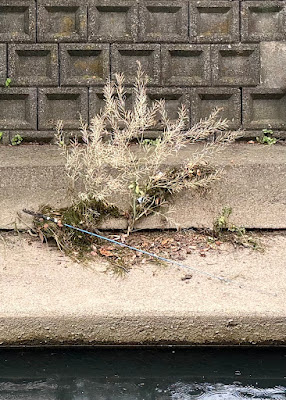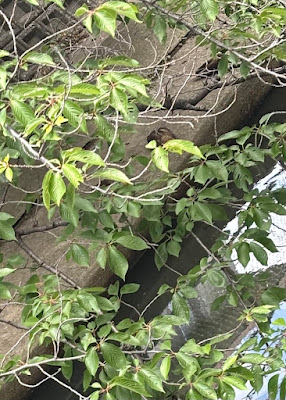Bonus(?):
This picture pretty much says it all... 7 losses in a row. And on Umeno's birthday no less (he did get a hit, but was tagged out when he tried to steal second). Maybe they need to eat more bananas...
Explorations and experiments in visual representations - multimodality, sensory ethnography, reflexivity, autoethnographic vignettes, ethnographic photography and ba...

Wednesday, June 18, 2025
Sunday, June 15, 2025
Japanese-style garden in Grand Rapids, Michigan , USA
"Bright morning light on pond and path around the garden"
https://www.flickr.com/photos/mi_shigapics/51427254438/in/album-72157712160299046
Thanks to Guven Witteveen for sharing this info through the Society for East Asian Anthropology listserv. Guven's comments:
Probably there are many cities and countries with some form of Japanese-style garden. Of all the cultural landscapes around the world, there only seem to be a few traditions so widely exported during colonial eras and during global times today. Among the many forms of Soft Power, I wonder how gardens fit in at the level of individual impressions formed and popular imagination, too.The link he provided comes from the sister-city relationship between Grand Rapids, Michigan and Omi-Hachiman in Shiga prefecture, Japan.
Context: As we mark 30 Years of Frederik Meijer Gardens & Sculpture Park, we're also honoring a special milestone: 10 Years of the Richard & Helen DeVos Japanese Garden! 🌸
This serene oasis was crafted by the visionary Hoichi Kurisu and Kurisu International, a firm renowned for creating "inner spaces" that inspire and heal. Their unique approach weaves together the essence of place, people, and purpose to nurture nature's restorative power. 🌿
Did you know that Hoichi's original design remained remarkably consistent from concept to completion? 📝It's a testament to his clear vision! In the final summer before its opening, about 30 artisans from Japan joined us to bring this tranquil haven to life. Many structures were built in Japan and reassembled on site, with a large tent housing material shipped from across the globe. 🌏
Hoichi is an architect of space, crafting intimate areas that unfold into expansive strolling gardens. Each visit reveals new wonders! Join us in celebrating these milestones and experience the beauty of art and nature intertwined.
#MeijerGardens #JapaneseGarden #30Years #10Years #NatureMeetsArt
Link to "Meijer Gardens in Grand Rapids" flickr page:
https://www.flickr.com/photos/mi_shigapics/albums/72157712160299046/
Tuesday, June 10, 2025
When it rains hard, the water rises and litter and other debris floats down the stream, oftentimes to be caught in a web of weeds and plants on the concrete banks... Apparently someone lost their fishing pole and it ended up here. Why? Did the fish pull the pole in the water? Did the fisherman have a bad day and in a fit of rage thrust his pole into the stream? So many questions, so many stories... Like, why do so many people throw their garbage away in the stream? This is the real Japan...
UPDATE 6/18/25:
It might be hard to see, but a pigeon picks the weeds and litter in search of food... Or th help clean the mess? Meanwhile (harder to see), a few ducks are chilling downstream in the shade. Remember when the weeds looked like this? https://visualanthropologyofjapan.blogspot.com/2025/04/2025-na-no-hana-relations.html
It might be hard to see, but a pigeon picks the weeds and litter in search of food... Or th help clean the mess? Meanwhile (harder to see), a few ducks are chilling downstream in the shade. Remember when the weeds looked like this? https://visualanthropologyofjapan.blogspot.com/2025/04/2025-na-no-hana-relations.html
Sunday, June 8, 2025
New Publication: "An archive of archives lost" by Dada Docot
Abstract: ‘An Archive of Archives Lost’ is an affective autoethnographic visual essay that examines the devastating impact of climate change through the lens of personal loss. The Philippines is among the countries most vulnerable to the ongoing climate crisis, with tropical storms getting stronger and more frequent. As a result of the intensified damage, many homes have lost their personal photographic archive, which used to bring together families and community through shared memories. The repeated experience of typhoons, flooding, and loss has made the community attuned to a routine cycle of letting go. The destruction of photographs symbolizes a deeper loss of cultural and social ties whose affective impact I explore.
Open Source full text article: https://www.tandfonline.com/doi/full/10.1080/17540763.2025.2487588
Docot, D. (2025). An archive of archives lost. Photographies, 18(2), 223–244. https://doi.org/10.1080/17540763.2025.2487588
Open Source full text article: https://www.tandfonline.com/doi/full/10.1080/17540763.2025.2487588
Docot, D. (2025). An archive of archives lost. Photographies, 18(2), 223–244. https://doi.org/10.1080/17540763.2025.2487588
Subscribe to:
Comments (Atom)










